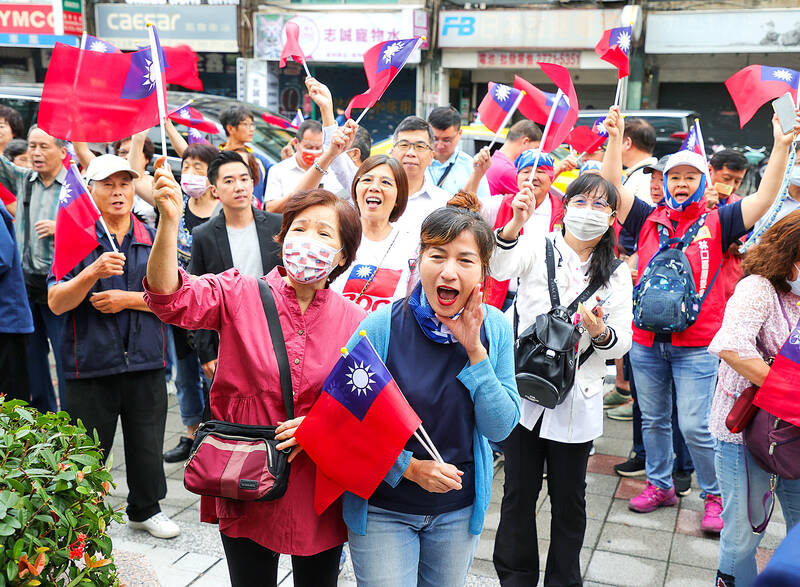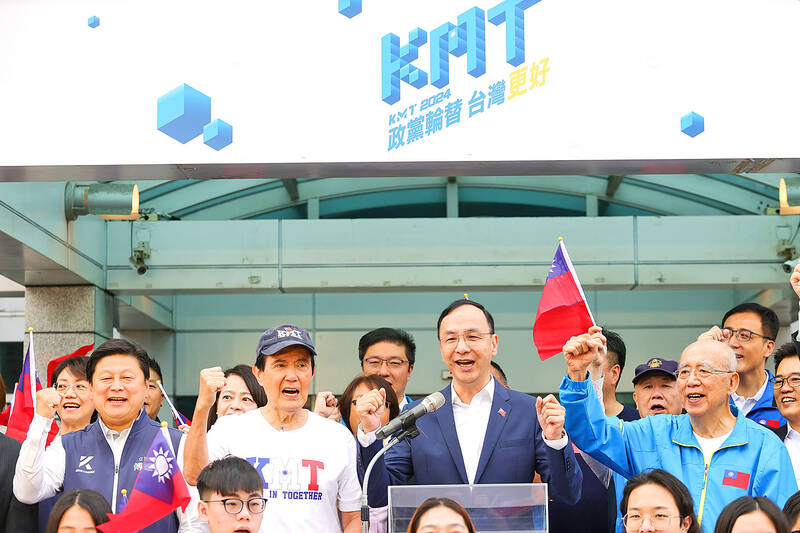Chinese Nationalist Party (KMT) Chairman Eric Chu (朱立倫) at the KMT’s separate flag-raising event for the Double Ten National Day yesterday said that the Democratic Progressive Party (DPP) was sowing ideological division in the nation.
He made the remark hours before President William Lai (賴清德) called for unity in his National Day presidential address.
Former president Ma Ying-jeou (馬英九) and KMT lawmakers occupying leadership positions in the party were seen attending the KMT event instead of partaking in the official ceremony.

Photo: CNA
“The Republic of China [ROC] was created by Sun Yat-sen (孫中山) 113 years ago, who led the revolution alongside sages and saints,” Chu said.
“The KMT forever stands with the people in defense of the ROC and Taiwan’s economic development, peace and democracy,” Chu added.
The KMT supports all bills and budget proposals beneficial to Taiwanese and national security, as the party is pursuing legislative reform and aims to broaden local governments’ self-ruling powers, especially in fiscal matters, he said.

Photo: CNA
“The party stands firmly in support of cross-strait peace and economic advancement on the path of peace,” the KMT chairman said, adding that peace underpins the party’s commitment to the so-called “1992 consensus” and the Constitution.
The so-called “1992 consensus” is a term former Mainland Affairs Council chairman Su Chi (蘇起) in 2006 admitted making up in 2000. It refers to a tacit understanding between the KMT and the Chinese government that both sides of the Taiwan Strait acknowledge there is “one China,” with each side having its own interpretation of what “China” means.
“It is a shame that Lai’s presidency so far has shown that strife is the only word in his dictionary,” Chu said.
The DPP’s “prejudiced ideology” is to blame for the strife in the Taiwan Strait and Taiwanese government, he added.
The DPP must cross the political divide by giving up its ideological positions, he said.
In the 21st century, the DPP should give up its steadfast support for Taiwanese independence, and opposition to nuclear energy and the death penalty,” Chu said.
“Taiwanese independence is a dead end,” he added.
Ma said that he declined to attend the official National Day ceremony in protest of the president’s stance on the nation’s sovereignty.
There are no two nations across the Taiwan Strait, but there are two areas that can coexist in peace, Ma said, adding that Lai’s new “two states theory” has branded the president a “troublemaker” in international eyes.
At a separate event, Taiwan Statebuilding Party Chairman Wang Hsing-huan (王興煥) slammed Lai’s endorsement of the ROC name as leading the Taiwanese independence movement into “a dead end.”
The government should handle the ROC national identity with care in its bid to capture political capital, lest it allows the enemy to set definitions for itself, he added.
Taiwan should seize the opportunity created by the particular conditions of international society to escape the ideological framework from the conflict between the two Chinas, National Taiwan University history professor Chou Wan-yao (周婉窈) said.
To identify with the ROC or the People’s Republic of China is to endorse China’s so-called unification and Taiwan’s disappearance as an entity, Chou said.
Meanwhile, the Taiwan People’s Party (TPP) in a statement said that Lai is coming to the realization that the people are above partisan interests and that the president should practice unity by working with the opposition.

ENTERTAINERS IN CHINA: Taiwanese generally back the government being firm on infiltration and ‘united front’ work,’ the Asia-Pacific Elite Interchange Association said Most people support the government probing Taiwanese entertainers for allegedly “amplifying” the Chinese Communist Party’s propaganda, a survey conducted by the Asia-Pacific Elite Interchange Association showed on Friday. Public support stood at 56.4 percent for action by the Mainland Affairs Council and the Ministry of Culture to enhance scrutiny on Taiwanese performers and artists who have developed careers in China while allegedly adhering to the narrative of Beijing’s propaganda that denigrates or harms Taiwanese sovereignty, the poll showed. Thirty-three percent did not support the action, it showed. The poll showed that 51.5 percent of respondents supported the government’s investigation into Taiwanese who have

South Korean K-pop girl group Blackpink are to make Kaohsiung the first stop on their Asia tour when they perform at Kaohsiung National Stadium on Oct. 18 and 19, the event organizer said yesterday. The upcoming performances will also make Blackpink the first girl group ever to perform twice at the stadium. It will be the group’s third visit to Taiwan to stage a concert. The last time Blackpink held a concert in the city was in March 2023. Their first concert in Taiwan was on March 3, 2019, at NTSU Arena (Linkou Arena). The group’s 2022-2023 “Born Pink” tour set a

A Philippine official has denied allegations of mistreatment of crew members during Philippine authorities’ boarding of a Taiwanese fishing vessel on Monday. Philippine Bureau of Fisheries and Aquatic Resources (BFAR) spokesman Nazario Briguera on Friday said that BFAR law enforcement officers “observed the proper boarding protocols” when they boarded the Taiwanese vessel Sheng Yu Feng (昇漁豐號) and towed it to Basco Port in the Philippines. Briguera’s comments came a day after the Taiwanese captain of the Sheng Yu Feng, Chen Tsung-tun (陳宗頓), held a news conference in Pingtung County and accused the Philippine authorities of mistreatment during the boarding of

88.2 PERCENT INCREASE: The variants driving the current outbreak are not causing more severe symptoms, but are ‘more contagious’ than previous variants, an expert said Number of COVID-19 cases in the nation is surging, with the Centers for Disease Control (CDC) describing the ongoing wave of infections as “rapid and intense,” and projecting that the outbreak would continue through the end of July. A total of 19,097 outpatient and emergency visits related to COVID-19 were reported from May 11 to Saturday last week, an 88.2 percent increase from the previous week’s 10,149 visits, CDC data showed. The nearly 90 percent surge in case numbers also marks the sixth consecutive weekly increase, although the total remains below the 23,778 recorded during the same period last year,